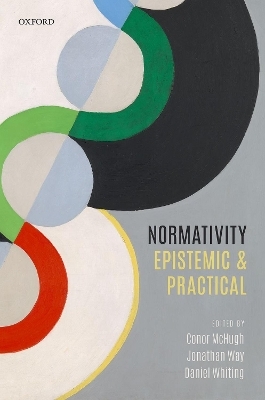
Normativity
Oxford University Press (Verlag)
978-0-19-875870-9 (ISBN)
What should I do? What should I think? Traditionally, ethicists tackle the first question, while epistemologists tackle the second. Philosophers have tended to investigate the issue of what to do independently of the issue of what to think, that is, to do ethics independently of epistemology, and vice versa. This collection of new essays by leading philosophers focuses on a central concern of both epistemology and ethics: normativity. Normativity is a matter of what one should or may do or think, what one has reason or justification to do or to think, what it is right or wrong to do or to think, and so on. The volume is innovative in drawing together issues from epistemology and ethics and in exploring neglected connections between epistemic and practical normativity. It represents a burgeoning research programme in which epistemic and practical normativity are seen as two aspects of a single topic, deeply interdependent and raising parallel questions.
Conor McHugh is Associate Professor in Philosophy at the University of Southampton. He works on a range of topics in epistemology, philosophy of mind, and ethics broadly construed. These include the nature of belief and of attitudes more generally, normativity, reasons and reasoning, mental agency, doxastic non-voluntarism and self-knowledge. He has published in Ethics, Philosophy and Phenomenological Research, Philosophical Issues, Philosophical Studies, Analysis, Analytic Philosophy, Erkenntnis, Thought, Synthese, the European Journal of Philosophy, Pacific Philosophical Quarterly, and collections published by OUP and Ithaque, among other places. Jonathan Way is Associate Professor in Philosophy at the University of Southampton. He works on a range of topics in ethics and epistemology, broadly construed. These include the nature of reasons, rationality, value, normativity, and reasoning. He has published papers in Ethics, Philosophy and Phenomenological Research, Australasian Journal of Philosophy, Philosophical Studies, Philosophical Quarterly, Oxford Studies in Metaethics, Philosophical Issues, the Oxford Handbook of Reasons and Normativity, and Analysis, among other places. Daniel Whiting is Associate Professor in Philosophy at the University of Southampton. He works on a wide range of subjects, including epistemology, ethics, philosophy of language, aesthetics, philosophy of mind, and the history of philosophy. Recent topics include: reasons and rationality; the norms of belief, assertion, and practical reasoning; normative testimony; and epistemic value. He has published numerous papers in journals such as Noûs, Philosophical Studies, Analysis, Erkenntnis, British Journal of Aesthetics, Journal of Ethics and Social Philosophy, Canadian Journal of Philosophy, and Pacific Philosophical Quarterly.
Conor McHugh, Jonathan Way, and Daniel Whiting: Introduction
1: Charity Anderson: Putting Fallibilism to Work
2: Jessica Brown: Pragmatic Approaches to Belief
3: Ulrike Heuer: The Relevance of the Wrong Kind of Reasons
4: David Hunter: Directives for Knowledge and Belief
5: Benjamin Kiesewetter: How Reasons are Sensitive to Available Evidence
6: Clayton Littlejohn: Evidence and its Limits
7: Errol Lord: The Explanatory Problem for Cognitivism about Practical Reason
8: Matthew McGrath: Pragmatic Encroachment: Its Problems are Your Problems!
9: Kate Nolfi: Why Only Evidential Considerations Can Justify Belief
10: Baron Reed: Practical Interests and Reasons for Belief
11: Andrew Reisner: Two Theses about the Distinctness of Practical and Theoretical Normativity
12: Daniel Star: Reasoning with Reasons
13: Asbjørn Steglich-Petersen: Epistemic Instrumentalism, Permissibility, and Reasons for Belief
| Erscheinungsdatum | 17.04.2018 |
|---|---|
| Verlagsort | Oxford |
| Sprache | englisch |
| Maße | 164 x 241 mm |
| Gewicht | 608 g |
| Themenwelt | Geisteswissenschaften ► Philosophie ► Erkenntnistheorie / Wissenschaftstheorie |
| Geisteswissenschaften ► Philosophie ► Ethik | |
| ISBN-10 | 0-19-875870-7 / 0198758707 |
| ISBN-13 | 978-0-19-875870-9 / 9780198758709 |
| Zustand | Neuware |
| Haben Sie eine Frage zum Produkt? |
aus dem Bereich

![Was heißt Denken?. Vorlesung Wintersemester 1951/52. [Was bedeutet das alles?] - Martin Heidegger](/media/113619842)
